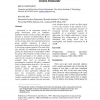Free Online Productivity Tools
i2Speak
i2Symbol
i2OCR
iTex2Img
iWeb2Print
iWeb2Shot
i2Type
iPdf2Split
iPdf2Merge
i2Bopomofo
i2Arabic
i2Style
i2Image
i2PDF
iLatex2Rtf
Sci2ools
HICSS
1998
IEEE
1998
IEEE
Measuring Disagreement in Groups Facing Limited Choice Problems
Agreement is an important concept in group interaction, both for computermediated and face-to-face groups. This paper presents a measure of disagreement, D, for groups facing limited-choice problems, based on the average pair-wise separations between group member responses. It allows a meaningful disagreement value to be assigned to any group response pattern. The same logic also provides an individual level measure, d, giving the disagreement of individuals within the group. The properties of this measure are explored and found to be similar to those expected of a measure of disagreement. For nominal data, such as produced by questionnaire responses, D offers a standard scale of disagreement from 0 to 1 for any size group facing any number of mutually exclusive choices. The measures can be inverted to show agreement, although this does not necessarily predict group coalescence, as polarized groups can also contain considerable agreement. The measure can be extended to ranked, interva...
| Added | 04 Aug 2010 |
| Updated | 04 Aug 2010 |
| Type | Conference |
| Year | 1998 |
| Where | HICSS |
| Authors | Brian Whitworth, Roy Felton |
Comments (0)

